Nrnp6566 week 7 - Samenvattingen en Aantekeningen
Op zoek naar een samenvatting over Nrnp6566 week 7? Op deze pagina vind je 85 samenvattingen over Nrnp6566 week 7.
Pagina 4 van de 85 resultaten
Sorteer op
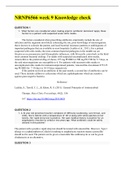
-
NRNP6566 week 9 Knowledge check
- Tentamen (uitwerkingen) • 6 pagina's • 2023
-
 EXAMINER001
EXAMINER001
-
- $10.49
- + meer info
NRNP6566 week 9 Knowledge check The factors considered when prescribing antibiotics empirically include the site of infection and the organism most likely colonizing the site, prior knowledge of microorganism that is known to colonize the patient, and local bacterial resistance patterns or antibiograms of important pathogens that are available in most hospitals (Leekha et al., 2011). For a patient suspected with otitis media, the most common bacterial pathogens in the middle ear are Streptoco...
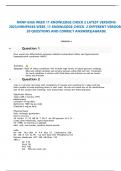
-
NRNP 6566 WEEK 11 KNOWLEDGE CHECK 2 LATEST VERSIONS 2023/NRNP6566 WEEK_11 KNOWLEDGE CHECK 2 DIFFERENT VERSIONS 20 QUESTIONS AND CORRECT ANSWERS|AGRADE
- Tentamen (uitwerkingen) • 15 pagina's • 2024
-
 SolutionsHub
SolutionsHub
-
- $10.49
- + meer info
Question 1 • Question 2 NRNP 6566 WEEK 11 KNOWLEDGE CHECK 2 LATEST VERSIONS 2023/NRNP6566 WEEK_11 KNOWLEDGE CHECK 2 DIFFERENT VERSIONS 20 QUESTIONS AND CORRECT ANSWERS|AGRADE VERSION A How would you differentiate between diabetic ketoacidosis (DKA) and hyperosmolar hyperglycemic syndrome (HHS)? Correct Answer: Both of these conditions will include high levels of blood glucose readings. DKA will exhibit acidosis and urinary ketones while HHS will not. Treatment for each condition is...
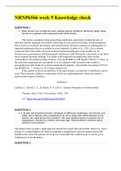
-
NRNP6566 week 9 Knowledge check
- Tentamen (uitwerkingen) • 6 pagina's • 2023
-
 BESTEXAMINER01
BESTEXAMINER01
-
- $10.99
- + meer info
NRNP6566 week 9 Knowledge check The factors considered when prescribing antibiotics empirically include the site of infection and the organism most likely colonizing the site, prior knowledge of microorganism that is known to colonize the patient, and local bacterial resistance patterns or antibiograms of important pathogens that are available in most hospitals (Leekha et al., 2011). For a patient suspected with otitis media, the most common bacterial pathogens in the middle ear are Streptoco...
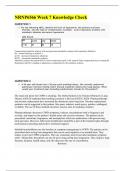
-
NRNP6566 Week 7 Knowledge Check
- Tentamen (uitwerkingen) • 7 pagina's • 2023
-
 TopExaminer001
TopExaminer001
-
- $10.96
- + meer info
NRNP6566 Week 7 Knowledge Check QUESTION 1 1. For the following ABGs, identify the level of hypoxemia, the primary acid base disorder, and the type of compensation. Example - acute respiratory acidosis with metabolic alkalosis and severe hypoxemia ABG Result NRNP6566 Week 7 Knowledge Check pH pCO2 pO2 HCO3 7.36 30 80 15 Compensated metabolic acidosis with no hypoxemia (metabolic acidosis with respiratory alkalosis) Ph – normal (leaning on acidosis ) pCO2 – decreased (respirator...
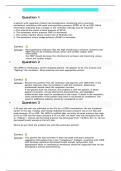
-
NRNP 6566/ NRNP6566 WEEK 7 KNOWLEDGE CHECK QUIZ
- Tentamen (uitwerkingen) • 5 pagina's • 2023
-
Ook in voordeelbundel
-
 Smartscoresstuvia
Smartscoresstuvia
-
- $9.49
- + meer info
A patient with respiratory failure has hemodynamic monitoring and is receiving mechanical ventilation with peak end-expiratory pressure (PEEP) of 10 cm H2O. Which information indicates that a change in the ventilator settings may be required? a. The arterial line shows a blood pressure of 90/46. b. The pulmonary artery pressure (PAP) is decreased. c. The cardiac monitor shows a heart rate of 58 beats/min. d. The pulmonary artery wedge pressure (PAWP) is increased.
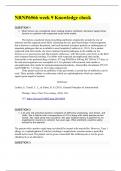
-
NRNP6566 week 9 Knowledge check
- Tentamen (uitwerkingen) • 6 pagina's • 2023
-
 TopExaminer001
TopExaminer001
-
- $12.43
- + meer info
NRNP6566 week 9 Knowledge check QUESTION 1 1. What factors are considered when making empiric antibiotic decisions? Apply those factors to a patient with suspected acute otitis media. QUESTION 2 1. A 32 year old preschool teacher complains of difficulty swallowing, sore throat, and chills. She is febrile with a temperature of 101.6 along with white patches on her tonsils. Her rapid strep test is positive. Her past medical history is positive for an anaphylactic reaction to cefaclor two ...
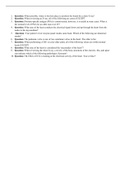
-
NRNP 6566 Week 7 Quiz (All Correct)
- Tentamen (uitwerkingen) • 1 pagina's • 2022
-
 KnowledgeBase
KnowledgeBase
-
- $20.49
- + meer info
1. Question: When possible, where is the best place to position the board for a chest X-ray? 2. Question: When reviewing an X-ray, all of the following are correct EXCEPT: 3. Question: Prostate-specific antigen (PSA) is controversial; however, it is useful in some cases. What is the normal level of PSA for an older man over 65? 4. Question: What area of the heart conducts the electrical signal down and up through the heart from the nodes to the myocardium? 5. Question: Your patient’s live...
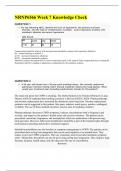
-
NRNP6566 Week 7 Knowledge Check
- Tentamen (uitwerkingen) • 7 pagina's • 2023
-
 TOPSCORERS
TOPSCORERS
-
- $10.98
- + meer info
NRNP6566 Week 7 Knowledge Check pH pCO2 pO2 HCO3 7.36 30 80 15 Compensated metabolic acidosis with no hypoxemia (metabolic acidosis with respiratory alkalosis) Ph – normal (leaning on acidosis ) pCO2 – decreased (respiratory alkalosis) HCO3 – decreased (rmetabolic acidosis) Metabolic acidosis (decreased HCO3) with no hypoxemia (pO2 is 80, normal) Fully compensated due to normal pH. Respiratory (pCO2) is leading to alkalemia to compensate for the metabolic acidosis. ...
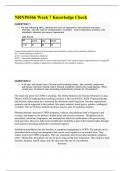
-
NRNP6566 Week 7 Knowledge Check
- Tentamen (uitwerkingen) • 7 pagina's • 2023
-
 TOPSCORERS
TOPSCORERS
-
- $10.98
- + meer info
NRNP6566 Week 7 Knowledge Check pH pCO2 pO2 HCO3 7.36 30 80 15 Compensated metabolic acidosis with no hypoxemia (metabolic acidosis with respiratory alkalosis) Ph – normal (leaning on acidosis ) pCO2 – decreased (respiratory alkalosis) HCO3 – decreased (rmetabolic acidosis) Metabolic acidosis (decreased HCO3) with no hypoxemia (pO2 is 80, normal) Fully compensated due to normal pH. Respiratory (pCO2) is leading to alkalemia to compensate for the metabolic acidosis. ...
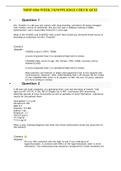
-
NRNP 6566 WEEK 3- 9 KNOWLEDGE CHECK QUIZ BUNDLE 100% VERIFIED
- Voordeelbundel • 7 items • 2021
-
 chamberlain
chamberlain
-
- $22.99
- 4x verkocht
- + meer info
1 Exam (elaborations) NRNP 6566 WEEK 3 KNOWLEDGE CHECK QUIZ 2 Exam (elaborations) NRNP 6566 Week 4 Knowledge Check 3 Exam (elaborations) NRNP 6566 Week 5 Knowledge Check 4 Exam (elaborations) NRNP 6566 Week 6 Knowledge Check 5 Exam (elaborations) NRNP6566 Week 7 Knowledge Check 6 Exam (elaborations) NRNP6566 KNOWLEDGE CHECK WEEK 8 7 Exam (ela

Hoeveel heb je al uitgegeven op Stuvia? Stel je eens voor dat alle andere studenten JOU betalen voor je samenvatting. Ka-ching! Ontdek alles over verdienen op Stuvia


